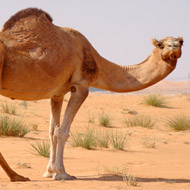
Competitors are judged on the size of their lips, jaw and nose
Twelve camels have been disqualified from a camel beauty pageant in Saudi Arabia for receiving Botox injections.
According to UAE publication The National, a veterinary surgeon was discovered days before the annual event performing plastic surgery on camels. Not only did he give the camels Botox, but he also performed surgery to reduce the size of their ears - something that is considered a winning feature on certain breeds.
The King Abdulaziz Camel Beauty Contest is the largest camel festival in the Gulf, attracting thousands of participants every year. But a beautiful camel isn’t just defined by its height and hump. Other factors, such as the size of its lips, jaw and nose also come into play.
To achieve the desired ‘inflated’ look, some breeders will turn to Botox and collagen fillers. With prize money totalling US$57 million, cheaters have also been known to pull on their camel’s lips to make them look longer.
Some 300,000 visitors have attended the festival since it began two years ago and camel breeds such as the majahim can sell for millions of dollars. But Botox and collagen fillers last for several months and, by the time a buyer finds out they’ve been scammed, it is usually too late for recourse.
Attendees of the beauty pageant are now calling on the organisers to apply a fine to anyone who is caught cheating. Al Mazourei, a regular attendee at Gulf festivals and son of a top Emirati breeder, told The National:
“The people who are just in the camel competition to make it more valuable, they are cheating everyone. A fine should be applied. In camel racing, whoever is using drugs is fined about 50,000 Dirhams in Abu Dhabi. The fine is not yet applied for beauty camels.”



 The latest
The latest